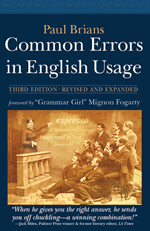The subjunctive mood, always weak in English, has been dwindling away for centuries until it has almost vanished. According to traditional thought, statements about the conditional future such as “If I were a carpenter . . .” require the subjunctive “were,” but “was” is certainly much more common. Still, if you want to impress those in the know with your usage, use “were” when writing of something hypothetical, unlikely, or contrary to fact.
The same goes for other pronouns: “you,” “she,” “he,” and “it.” In the case of the plural pronouns “we” and “they” the form “was” is definitely nonstandard, of course, because it is a singular form.
BUY THE BOOK!
